Praise for The Best American Poetry Each year, a vivid snapshot of what a distinguished poet finds exciting, fresh, and memorable: and over the years, as good a comprehensive overview of contemporary poetry as there can be. Robert Pinsky The Best American Poetry series has become one of the mainstays of the poetry publication world. For each volume, a guest editor is enlisted to cull the collective output of large and small literary journals published that year to select seventy-five of the years best poems. The guest editor is also asked to write an introduction to the collection, and the anthologies would be indispensable for these essays alone; combined with [David] Lehmans state-of-poetry forewords and the guest editors introductions, these anthologies seem to capture the zeitgeist of the current attitudes in American poetry. Academy of American Poets A high volume of poetic greatness... there is brilliance, there is innovation, there are surprises. there is brilliance, there is innovation, there are surprises.
The Villager A years worth of the very best! People A preponderance of intelligent, straightforward poems. Booklist Certainly it attests to poetrys continuing vitality. Publishers Weekly (starred review) A best anthology that really lives up to its title. Chicago Tribune An essential purchase. The Washington Post For the small community of American poets, The Best American Poetry is the Michelin Guide , the Readers Digest , and the Prix Goncourt. LObservateur
David Lehman was born in New York City.
Educated at Stuyvesant High School and Columbia University, he spent two years as a Kellett Fellow at Clare College, Cambridge, and worked as Lionel Trillings research assistant upon his return from England. His recent and forthcoming publications include Playlist (Pittsburgh, 2019), One Hundred Autobiographies : A Memoir (Cornell University Press, 2019), and Poems in the Manner Of (Scribner, 2017). He is the editor of The Oxford Book of American Poetry (2006) and Great American Prose Poems : From Poe to the Present (Scribner, 2003). A Fine Romance : Jewish Songwriters, American Songs (Schocken) won the Deems Taylor Award from the American Society of Composers, Authors, and Publishers (ASCAP) in 2010. He has also written books about murder mysteries, the case of Paul de Man, the New York School of poets, and Frank Sinatra. A contributing editor of The American Scholar , he edits the journals weekly online feature Next Line, Please.
Lehman lives in New York City and in Ithaca, New York.
FOREWORD
by David Lehman

In The Unquiet Grave , his book of penses in the manner of Pascal, Cyril Connolly has a line that in its form may be the prose equivalent of a two-line imagist poem. Poets arguing about modern poetry: jackals snarling over a dried-up well. Connolly wrote the line in 1945, but you can still hear that snarl today. Ubiquitous instruments of social media make it easy for anyone to pop off, get attention, air grievances, join the mob. While there is little enough criticism in the traditional sense, there is a tremendous amount of rage, and it fuels a censorious impulse that spells trouble for writers, publishers, believers in free speech, and readers of works that get denounced for one reason or another and then get pulled off the shelves.
The mob struck often in 2018. Certain radio stations, bowing to pressure, refused to air Baby, Its Cold Outside, the classic duet and holiday favorite that won an Academy Award for Frank Loesser in 1949. Recorded by such redoubtable duos as Betty Carter and Ray Charles, Dinah Shore and Buddy Clark, Margaret Whiting and Johnny Mercer, the song is a long good-bye as on a balcony in Verona, only our Romeo begs for five minutes more and Juliet doesnt say yes and she doesnt say no.will stop at nothing to take advantage of the damsel in distress. This is a nutty argument, reminiscent of the inattentive college student who somehow got the idea that The Rime of the Ancient Mariner describes a journey to a honey-sweet land of charm and romance. The distinguished First Amendment attorney Floyd Abrams deplored what he called the self-abasing decisions made by important publications. Three such stood out for him.
The New Yorker invited Trump crony Steve Bannon to take part in a discussion, where you may be quite sure that he would have been raked over the coals by moderator and audience. But the magazine felt compelled to withdraw the invitation, because of Bannons right-wing views. More grievous was the case of Ian Buruma, who lost his job as editor of The New York Review of Books , because he published a mediocre and arguably repellent article by a man with a history of sexual harassment. Reflections from a Hashtag by former CBC radio broadcaster Jian Ghomeshi reeked of puffed-up self-pity, but thats not what caused an outrage. What irked people was the very fact that the paper was giving a hearing to the disgraced broadcaster. Staffers grumbled that the decision to publish the piece was made against their wishes.
Social media magnified the furor. Now let it work, Mark Antony said after firing up the crowd in Julius Caesar. Mischief, thou art afoot. According to Buruma, a cabal of university presses, without whose advertising dollars the paper could not long survive, threatened a boycott. And the magazine that had once instructed readers on how to make a Molotov cocktailthe magazine that prided itself on printing fiery exchanges of in-your-face letters from angry readers and unrepentant writersfired its top editor, a New York Review contributor since 1985. I was convicted on Twitter, Buruma said.
In midsummer 2018 a poem in the pages of The Nation spurred an angry backlash and a craven apology. How To by Anders Carlson-Wee used Black English for a monologue from an apparently homeless person asking for a handout. When it transpired that the author was white, a Twitter firestorm erupted in protest of the writers appropriation of a black persons voice. The criticism, shrill and shaming, had its intended effect. The poetry coeditors of the magazine apologized, as did the author. So much for the tradition of editorial independence.
So much for the habit of standing behind what you have published and welcoming letters to the editor in protest or support. Longtime Nation columnist Katha Pollitt voiced her dismay on Facebook: So embarrassing! The poetry editors, Stephanie Burt and Carmen Gimenez Smith, liked the poem enough to publish it, which means they read it many times and did not see problems, but when challenged by the twitter mob they folded and sent themselves to reeducation camp. Now the whole magazine looks ridiculous. Thanks a lot! We who work on The Best American Poetry are familiar with such controversies. For all we know, it is possible that something in this edition of The Best American Poetry may raise hackles. We dont anticipate that, but even if we did, I like to think that we would stick to our guns as we offer the seventy-five poems that Major Jackson, our editor, has chosen as representative of the best poetry getting written today.
I advocate making bold statements, offering no apologies, and leaving it up to others to mount arguments in favor of, or against, poems that are their own best defense.  Major Jackson is one of the foremost poets of his generation, and a natural choice to make the selections for The Best American Poetry 2019. As we headed into production, I asked Major how the experience affected him. Most of my free time was spent reading to the 10th power, he said, balancing this activity with work on his own manuscript in progress, The Absurd Man. Id find myself tinkering on old poems (or yes, starting a new poem) after having imbibed on the verbal richness of others almost like having eaten a can of Popeyes spinach. In his own poems he felt pushed, he added, toward great pockets of humor, if not a lyricism that hinted at the issues facing us as a society.
Major Jackson is one of the foremost poets of his generation, and a natural choice to make the selections for The Best American Poetry 2019. As we headed into production, I asked Major how the experience affected him. Most of my free time was spent reading to the 10th power, he said, balancing this activity with work on his own manuscript in progress, The Absurd Man. Id find myself tinkering on old poems (or yes, starting a new poem) after having imbibed on the verbal richness of others almost like having eaten a can of Popeyes spinach. In his own poems he felt pushed, he added, toward great pockets of humor, if not a lyricism that hinted at the issues facing us as a society.
Next page

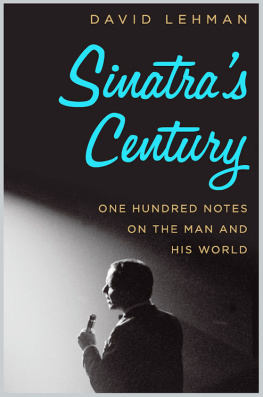
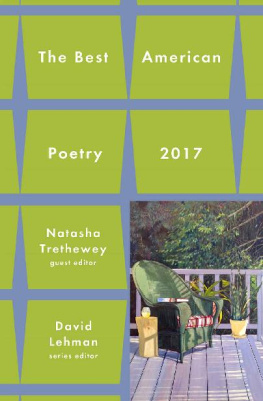
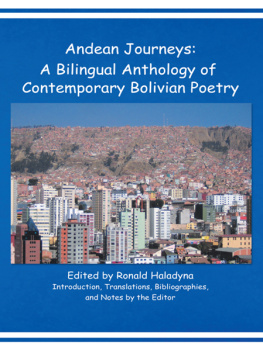
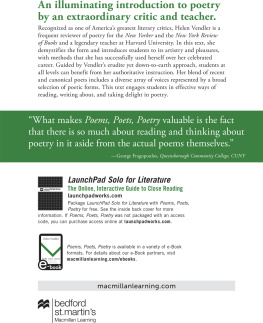
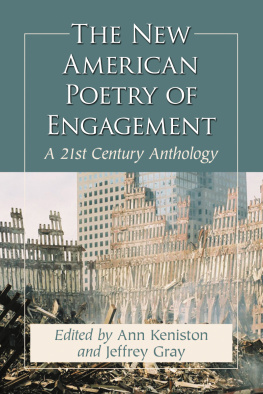

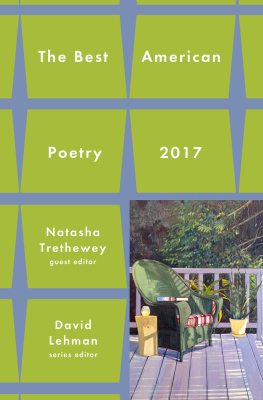

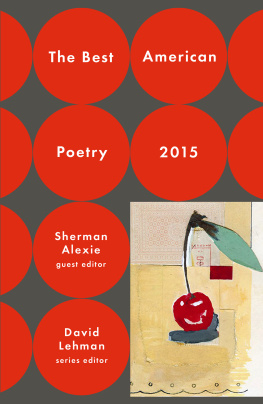
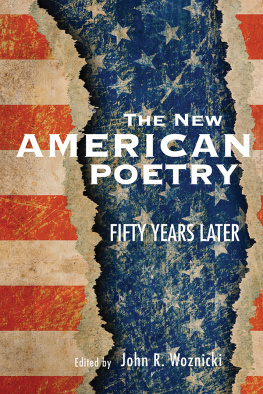
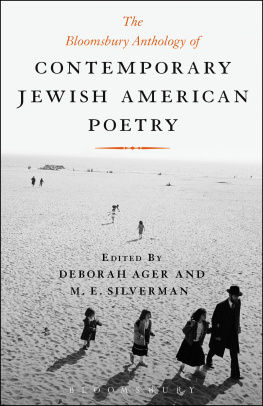
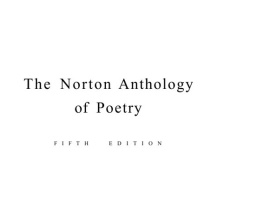

 In The Unquiet Grave , his book of penses in the manner of Pascal, Cyril Connolly has a line that in its form may be the prose equivalent of a two-line imagist poem. Poets arguing about modern poetry: jackals snarling over a dried-up well. Connolly wrote the line in 1945, but you can still hear that snarl today. Ubiquitous instruments of social media make it easy for anyone to pop off, get attention, air grievances, join the mob. While there is little enough criticism in the traditional sense, there is a tremendous amount of rage, and it fuels a censorious impulse that spells trouble for writers, publishers, believers in free speech, and readers of works that get denounced for one reason or another and then get pulled off the shelves.
In The Unquiet Grave , his book of penses in the manner of Pascal, Cyril Connolly has a line that in its form may be the prose equivalent of a two-line imagist poem. Poets arguing about modern poetry: jackals snarling over a dried-up well. Connolly wrote the line in 1945, but you can still hear that snarl today. Ubiquitous instruments of social media make it easy for anyone to pop off, get attention, air grievances, join the mob. While there is little enough criticism in the traditional sense, there is a tremendous amount of rage, and it fuels a censorious impulse that spells trouble for writers, publishers, believers in free speech, and readers of works that get denounced for one reason or another and then get pulled off the shelves.  Major Jackson is one of the foremost poets of his generation, and a natural choice to make the selections for The Best American Poetry 2019. As we headed into production, I asked Major how the experience affected him. Most of my free time was spent reading to the 10th power, he said, balancing this activity with work on his own manuscript in progress, The Absurd Man. Id find myself tinkering on old poems (or yes, starting a new poem) after having imbibed on the verbal richness of others almost like having eaten a can of Popeyes spinach. In his own poems he felt pushed, he added, toward great pockets of humor, if not a lyricism that hinted at the issues facing us as a society.
Major Jackson is one of the foremost poets of his generation, and a natural choice to make the selections for The Best American Poetry 2019. As we headed into production, I asked Major how the experience affected him. Most of my free time was spent reading to the 10th power, he said, balancing this activity with work on his own manuscript in progress, The Absurd Man. Id find myself tinkering on old poems (or yes, starting a new poem) after having imbibed on the verbal richness of others almost like having eaten a can of Popeyes spinach. In his own poems he felt pushed, he added, toward great pockets of humor, if not a lyricism that hinted at the issues facing us as a society.